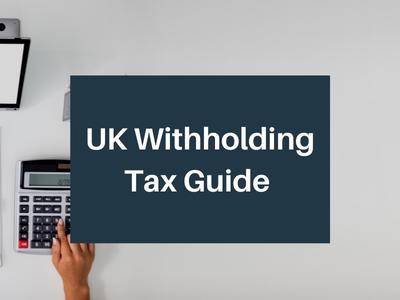A Complete United Kingdom Withholding Tax Guide

If you are an expatriate or non-resident, taxes apply to you (if liable). However, there is another tax mechanism at work, Withholding Tax (WHT), and that is what we shall be exploring. You may or may not have known this tax, but employers are legally meant to pay them. Yes, you read correctly. Your employer pays for these taxes on your behalf!
If your curiosity has been roused and you want to know more, you have come to the right place. This article will serve as an introduction. This article will provide a brief run-down on what Withholding Tax is and how it works.
What is Withholding Tax?
In the simplest of terms, a Withholding Tax is a tax imposed by the government on payers (employers) parties. Derived explicitly from the income earned by non-residents (payees) and paid to the government. In other words, part of your gross income is deducted and delivered directly to His Majesty’s Revenue and Customs (HMRC).
As of 2022, the United Kingdom’s Domestic Law requires companies to Withhold Tax on payments related to interests or royalties. Dividends are excluded from Withholding tax and are often paid in gross, though there are exceptions. Numerous factors also influence WHT payment for interests, royalties and (If applicable) dividends. These factors include Double Taxation Treaties (DTTs), nationality, involvement of property, specific exceptions and more.
WHTs for Interest and Royalties
United Kingdom’s Domestic Law states that companies making payments of United Kingdom-source interest need to withhold tax at 20%. This is regardless if the payees are residents, though there are exemptions. Payers must also ascertain whether DTTs and the payee’s territory of residence qualify for further reductions before paying HMRC.
Companies must also pay for royalties that arise in the United Kingdom at 20% of WHT. These royalties include design, model, copyright, patent, plan, secret formula, trademark, and brand names. Payers can make royalty payments provided they are reasonably certain conditions of the EU Interest and Royalties are met. This can be done without HMRC’s directions but must first ascertain if domestic rate reductions are possible.
Things You Should Know
WHTs for interest and royalties each have unique exceptions and conditions based on nationality (DTTs). These calculations must be done properly to avoid potential misreporting, errors and penalties. If you face issues determining your WHT rates, you may want to seek expert help.

